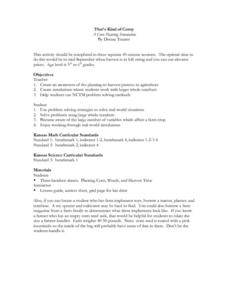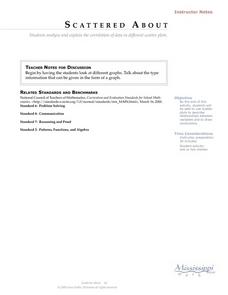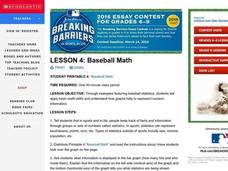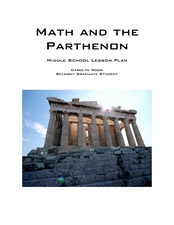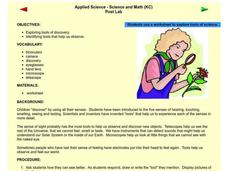Curated OER
What's Your Average? What Do You Mean? I'm More Than Just Average
Upper grade and middle schoolers collect data, analyze and interpret the data. This three-part lesson should provide learners with a firm understanding about the differences between mean, median, and mode and how to perform the...
Albert Shanker Institute
Economic Causes of the March on Washington
Money can't buy happiness, but it can put food on the table and pay the bills. The first of a five-lesson unit teaches pupils about the unemployment rate in 1963 and its relationship with the March on Washington. They learn how to create...
Curated OER
That's Kind of Corny!
Learners apply math skills to determining how much corn seed to plant in 100 acres. They compute the amount of weed killer needed and after totaling how many bushels per acre they harvest, they calculate their profits.
Curated OER
A Slice of Pi
Math pupils, by viewing a video, discover the history of pi and some of the applications of its uses in the world today. They conduct an experiment by measuring the diameter and circumference of various circular objects to calculate...
Curated OER
Scattered About
Students are introduced to the concept of scatter plots after reviewing the various types of graphs. In groups, they analyze the type of information one can receive from a scatter plot and identify the relationship between the x and y...
Curated OER
Introducing the Concept: Percents
Students explore the math concept of percents. In this percents lesson, students examine visual examples of the relationships among fractions, decimals, and percents. Students also practice solving problems that their instructors model.
Curated OER
Baseball Math
Students collect data on baseball plays. In this statistics lesson plan, students graph their data and make predictions based on their observation. They calculate what the probability is that a favorable outcome would happen.
Curated OER
The Integration of Science and Math Through Ecosystems
Students use the disciplines of math and science to examine ecosystems. In groups, they calculate the amount of supplies they would need to live in the classroom for one day, a week and a year. Using this information, they apply it to...
Curated OER
All in the Family
Students use data to make a tally chart and a line plot. They find the maximum, minimum, range, median, and mode of the data. Following the video portion of the lesson, students will visit a Web site to test their data collection skills...
Curated OER
Graphs and Functions
Use this series of activities to introduce learners to graphing functions. They graph both linear and quadratic equations by hand and with a Graph Sketcher Tool. Several imbedded links and handouts are included in the activity.
Curated OER
Tessellations: Geometry and Symmetry
Learners explore the concept of tessellations. In this tessellations lesson, students use an applet to construct tessellations. Learners use regular polygons to construct tessellations. Students find patterns and symmetry in their...
Curated OER
No Foot, No Horse
Why do horses wear shoes? Why do people wear shoes? Using worksheets, which are embedded in the plan, learners write descriptive paragraphs about their own shoes, classify a pile of shoes, and also engage in math games about the variety...
Curated OER
Introducing the Concept: Rates
Sixth graders explore rates as a specific type of ratio, using visual examples of unit rates and unit prices to increase comprehension. They also practice solving problems that are modeled by the instructor. The well-scripted...
Curated OER
Blubber Gloves
The ways that animals adapt to their environments is quite remarkable. In this life science lesson, fifth graders take a look at some of the ways that aquatic animals that live in Arctic or Antarctic waters survive. They perform an...
Curated OER
Past and Present: Using baseball statistics to teach math
Students use baseball cards to add up batting average and reinforce math skills. In this batting averages lesson plan, students use old baseball cards to practice different math skills and look at other baseball statistics.
Curated OER
Math and the Parthenon
Pupils relate math to different areas of construction. In this algebra lesson, students identify the relationship between shapes and the way math is used in architecture. They investigate properties of the Parthenon as it relates to...
Curated OER
Slopey Math
Students identify the slope of a line and use it to solve real life problems. In this algebra lesson, students write linear equations in slope intercept form and make a correlation to its relation to the real world. They use the slope an...
Curated OER
Applied Science - Science and Math Post-Lab
Students use scientific tools. In this Applied Science lesson, students investigate the use of scientific tools to enhance observation and discovery. Students indicate how each tool assists scientific work.
Curated OER
Is the Probability Probable?
Third graders compare experimental results with mathematical expectations of probabilities. They utilize a worksheet imbedded in this plan to gain practice with the concept of probability.
Curated OER
Making Decisions with Probability
Students explore probability. They discuss the likelihood of events happening and the terms certain, impossible, likely and unlikely. Students discuss various situations and the likelihood of that situation occurring.
Curated OER
Data Analysis, Probability, and Discrete Math: Lesson 5
Eighth graders are read the material that is printed in boldface type inside the boxes. Information in regular type inside the boxes and all information outside the boxes should not be read to them. They then find the mean, median,...
Curated OER
What Are My Chances?
Students calculate probability. In this instructional activity on probability, students use given data to calculate to chances of a given event occurring. Many of the calculations in this instructional activity are applicable to daily life.
Curated OER
The Game of Chance
Third graders use manipulatives to determine the probability of outcomes. In this probability lesson plan, 3rd graders roll dice and use spinners to determine the probability of outcomes. They determine if games are fair/unfair based on...
Alabama Learning Exchange
Pennies, Pennies and More Pennies
Learners determine the number of pennies needed to fill a room. In this pennies lesson plan, students work in groups to determine the number of pennies needed to fill a room. They compute the probability of the head of a pin...


